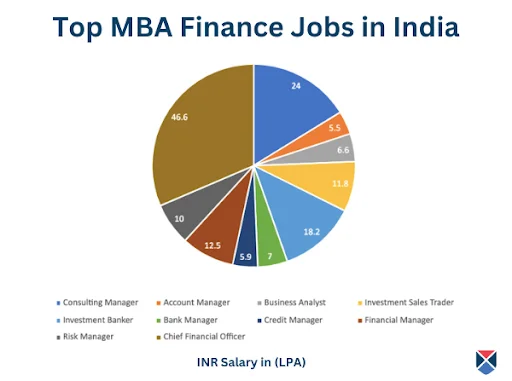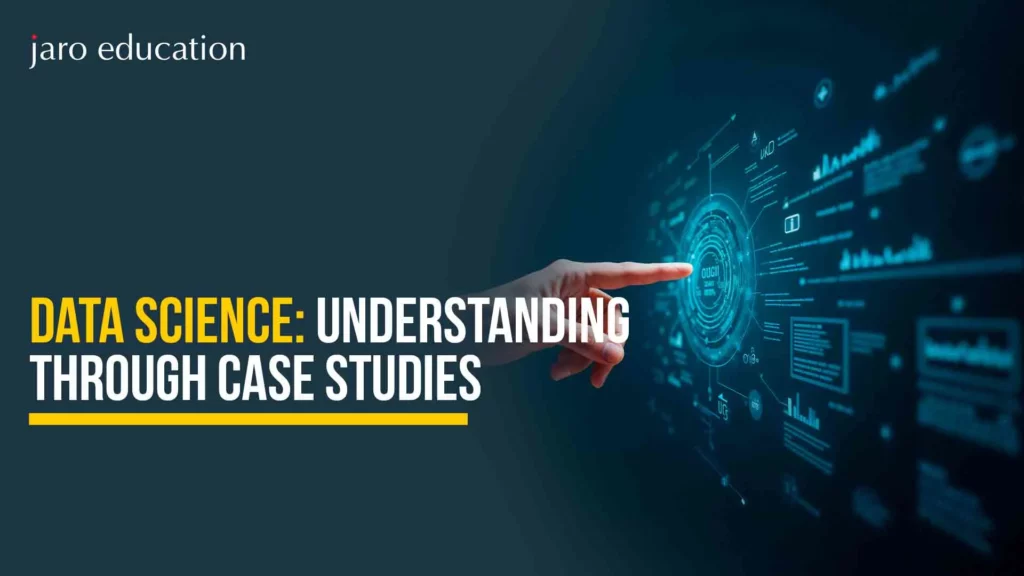Top 20 Interview Questions & Answers for Finance Students
Table of Contents

- jaro education
- 4, September 2023
- 4:00 pm
When candidates apply for any job role in the financial sector, it is common to go through an interview process with potential employers. Practising how to respond to interview questions can be beneficial in refining critical thinking skills and enhancing the ability to provide clear and concise answers. It helps candidates prepare for interviews and make a positive first impression on the interviewer. To assist individuals in their preparation for financial interviews, this blog covers 20 important finance interview questions, along with sample responses to some of them.
Key Aspects to Focus - Before Interview
When preparing for a finance interview, you should expect various questions covering different aspects of finance. Here are some key areas to focus on:
Qualifications and Experience
Be prepared to discuss your educational background, relevant certifications, and any previous experience in finance or related fields. Highlight specific projects or accomplishments that showcase your expertise.
Financial Knowledge
Expect questions that test your understanding of financial concepts. Be prepared to explain these concepts and provide examples.
Problem-Solving Skills
You may encounter quantitative and analytical questions that require you to solve complex mathematical problems or evaluate financial scenarios. Practise your problem-solving skills and demonstrate logical thinking and attention to detail.
Industry Awareness
Stay updated on current trends, news, and regulations in the finance industry. Be prepared to discuss how these developments may impact financial markets, investment decisions, or risk management strategies.
Behavioural Questions
Interviewers may ask about your strengths, weaknesses, teamwork abilities, leadership skills, and how you handle challenging situations. Prepare examples that demonstrate your competencies and provide insights into your professional demeanour.
Case Studies or Scenarios
Some interviews may include case studies or hypothetical scenarios that require you to analyse financial data, make recommendations, or assess potential risks. Practice analysing and interpreting financial information to respond to these questions effectively.
20 Interview Questions & Answers
Q1. Define Working Capital
Current Assets less Current Liabilities is essentially Working Capital. The amount of capital entailed in a company’s operations, such as account receivables, payables, inventory on hand, and many other items, is described by working capital. The quantity of money required to meet the company’s obligations, which must be met within a year, can also be determined by working capital.
Q2. What are the types of EPS calculation the analysts use?
Analysts use three types of EPS calculations: Basic EPS, Dilutive EPS, and Anti-Dilutive EPS. Essential EPS is used for companies with a simple capital structure and no convertible securities. Dilutive EPS is used for companies with complex capital structures and convertible securities that can potentially dilutive earnings. Anti-Dilutive EPS occurs when the conversion of securities increases the earnings for common shareholders.
Q3. What is the difference between future contracts and forward contracts?
A key difference between futures and forward contracts is their standardisation and trading methods. Futures contracts are standardised contracts traded on exchanges with predetermined lot sizes. Clearinghouses manage the market, eliminating counterparty risk. On the other hand, forward contracts are customisable over-the-counter contracts, allowing for any desired contract size. They do not trade on exchanges and lack a clearinghouse, exposing buyers and sellers to counterparty risk.
Q4. What causes a deferred tax liability to exist and why?
A Deferred Tax Liability is created when a company reports a tax expense in its financial statements expected to be paid to tax authorities in the future. It arises when the company pays less taxes to the authorities than what is reported as payable. This can occur due to differences in accounting methods used for financial reporting and tax purposes. For example, if a company uses a different depreciation method for tax purposes than what is used in its financial statements, a Deferred Tax Liability may be created.
Q5. What is the basic concept of the rights issue?
A rights issue is exclusively offered to a company’s existing shareholders at a predetermined price. It is a way for the company to raise additional capital by allowing its current shareholders to purchase more shares. The need for a rights issue can indicate that the company requires additional funds to fulfil its future obligations beyond what can be generated from its operating activities. It is crucial to analyse the reasons behind the rights issue to understand the company’s financial position and plans for utilising the raised capital.
Q6. What is the distinction between the clean and dirty prices of a bond, and how do they differ in their calculations?
The clean price of a bond represents the present value of the discounted future cash flows of the bond, excluding the interest payments. On the other hand, the dirty price of a bond includes the accrued interest in the calculation. It represents the present value of the discounted future cash flows of the bond, including the interest payments made by the issuing entity.
Q7. Which is more affordable, equity or debt?
Debt is tax-deductible and provides low returns, as compared to equity. Therefore, it is less expensive and preferred by some lenders who want to invest at an affordable rate.
Q8. Why is it crucial to record PP&E in this manner?
Property, Plant, and Equipment (PP&E) is generally accounted for in four sections on the balance sheet: original acquisition, depreciation, additions (capital expenditures), disposal, and so forth. One should also consider revaluation in addition to these four options. The primary capital asset for many organisations that produce revenue, profitability, and cash flow is PP&E.
Q9. When should a business think about issuing debt rather than equity?
A company’s capital structure should continuously be optimised. It can profit from the tax shelter of issuing debt if it has taxable income. It could make sense to issue debt if it decreases the company’s weighted average cost of capital if it has immediate steady cash flows and can pay the required interest payments.

Q10. What kind of budgeting method is appropriate for a business?
A reasonable budget, connected to the company’s overall strategic strategy, is achievable and risk-adjusted to provide for a margin of error. We require an iterative procedure involving all departments to obtain this budget.
Q11. What exactly does "goodwill" mean? Why is it used?
An intangible asset related to a company being acquired by another is goodwill. It can be characterised as a redundant cost price valuation against the same fundamental market value.
Q12. What are preference capital and hedging?
A tool to reduce risks is referred to as hedging capital. In other words, the primary goal of insurance and hedging may be similar. Precedence capital, conversely, is described as capital that is given precedence over equity capital for dividend payments and business closure.
Q13. Distinguish between real money and nominal money?
Real money has a fundamental purchasing power far more significant than nominal money, which is the main distinction between the two types of currency. On the other hand, the concept of technical enumeration or counting is connected to nominal money. Therefore, the nominal amount is evident in the bill.
Q14. What is the purpose of Treasury Bills in the context of the Government of India's short-term financial needs, and how do they differ from other types of securities in terms of their pricing?
The Indian government issues Treasury Bills, which are a type of money market instrument.The purpose of Treasury Bills in the context of the Government of India’s short-term financial needs is to raise funds to meet the immediate expenditure and requirements.
Like other investment options, Treasury bills do not provide you with an interest rate. These securities, on the other hand, have zero coupons and provide returns via the price difference, that is, the difference between the selling price and the discounted rate. This pricing method is known as discount pricing, making T-Bills a popular choice for investors seeking low-risk, short-term investments in the money market.
Q15. What does "short-term financing" mean?
To meet its immediate liquidity requirements, a corporation uses short-term financing. The corporation has 12 months from the financing date to pay back this short-term source of funding loan.
Q16. Why is the DCF method utilised, and what do we understand by it?
Discounted cash flow is known as DCF. It is a technique used to calculate the value of an investment based on anticipated future cash flows. Using predictions of how much money an investment will make in the future, the DCF technique is an analysis used to determine the value of an investment today.
Q17. What short-term finance options can one advise if the business needs money immediately?
(Any company may run into a challenging financial position. In that case, it will need a finance expert who can fix the issue swiftly. This question is intended to determine whether you have a strategy in place in the event of a financial emergency. By asking you this question, they can gauge how well you can spot and address problems with paying existing liabilities. It also shows how knowledgeable you are.)
Q18. What is RAROC?
RAROC is one of the most accurate techniques for determining a bank’s profitability. Expected returns may be computed using a more informed method that includes the determined economic capital and risk exposure.
Q19. Define debentures.
A certificate of loan agreement issued with the company’s stamp is referred to as a debenture. At the time of the bond’s maturity, the holder receives both the principal amount and a specified return.
Q20. What are adjustment entries?
After each accounting period, adjustment entries are passed. The fundamental goal of adjustment entries is to adjust nominal and other accounts to create a stable account on the balance sheet.
Preparation Tips
Here are some tips to help you prepare effectively:
Research the company
Gain a thorough understanding of the company’s history, mission, values, products/services, and recent news or developments. This will allow your answers to align with the company’s goals and demonstrate your genuine interest in the organisation.
Stay updated on industry trends
Stay informed about the latest trends, challenges, and regulations in the finance industry.
Review your resume
Familiarise yourself with the details mentioned in your resume. Be prepared to elaborate on your educational background, work experience, internships, and relevant skills or achievements.
Brush up on financial concepts
Revisit vital financial concepts such as financial statements, ratio analysis, valuation methods, risk management techniques, and investment strategies.
Practise mock interviews
Arrange mock interviews with a mentor, friend, or career advisor. Practice answering common interview questions, refining your responses, and improving your communication skills, body language, and overall confidence. Seek feedback to identify areas for improvement.
Conclusion
Remember, preparation is key for cracking any interview. The more you familiarise yourself with the company, industry, and your experiences, the better equipped you will be to showcase your skills and suitability for the role. The Post Graduate Certificate Programme in Banking and Finance offered by IIM Tiruchirappalli is highly valuable for finance aspirants preparing for interviews. Enrolling in it through Jaro Education will enhance your industry knowledge, accelerate innovation in the digital banking and financial sector, and contribute to your professional growth.










